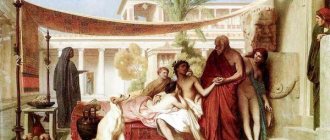Three sieves
One day a man came to Socrates and said:
- Do you know what your friend says about you?
Socrates answered him:
- Before you tell me this news, sift it through three sieves. The first is the sieve of truth. Are you sure that what you are about to tell me is true?
- Well, I heard it from others.
- See, you're not sure. The second sieve is the sieve of goodness. Will this news make me happy, will it be pleasant for me?
- Not at all.
- And finally, the third sieve is the sieve of benefit. Will this news be useful?
- I doubt.
“You see, you want to tell me news that has no truth or goodness, and besides, it is useless.” Why say it then?
Death of Socrates. David. Source: wikipedia.org
Attributed to Democritus
Sources claiming that the phrase “I know that I know nothing” was spoken by Democritus refer to the “Fragments of the Pre-Socratics” by the German philologist Hermann Diels (fragment 304), which indicates the authorship of Democritus with reference to the “Greek Vatican Codex”, which in turn refers to the authorship of Socrates in the same “Teaching of Academicians”.
The closest phrase of Democritus mentioned in the Academician:
...due to the obscurity of those things that prompted Socrates to admit his own ignorance, and before Socrates led to the same Democritus, Anaxagoras, Empedocles and almost all the ancients, who argued that nothing can be cognized, perceived, or known, for the senses weak, the mind is powerless, life is short and, as Democritus said, “the truth is hidden in the abyss”, that “everything rests on assumptions and tradition, and there is no place for truth anywhere, and, finally, that everything is hidden in darkness”
- “The Teaching of Academicians " Book II. Lucul. XII, 44:
About the bad character of mothers
Socrates once noticed that his eldest son was angry with his mother and said that she had a difficult character. Then the philosopher asked:
“You understand that when your mother tells you something, she doesn’t have any evil on her mind.” On the contrary, she wishes only the best for you, like no one else, and yet you are angry with her? Or do you believe that your mother wishes you harm?
“Of course not,” the son answered.
“So, even though she wishes you well and during your illness makes every effort to ensure that you get well, even though she earnestly prays to the gods for you and fulfills her vows, you still say that she has a difficult character?” I think that if you can't stand a mother like that, then you can't stand happiness.
What was Socrates talking about?
It is traditionally believed that these words of Socrates are given in Plato’s work (427-347 BC) “Apology of Socrates”, however, Plato’s Socrates pronounces similar words but quite different in meaning.
In the Apology of Socrates, when the oracle of the Temple of Apollo at Delphi called Socrates the wisest of the Hellenes (Greeks), he was surprised, because he believed that he knew nothing. But then, having started talking with people who insisted that they knew a lot, and asking them the most important and, at first glance, simple questions (what is virtue, beauty), he realized that, unlike others, if he doesn’t know, he doesn’t even think he knows:
...When I took a closer look at this man - there is no need to call him by name (...) it seemed to me that this husband only seemed wise to many others, and especially to himself, but for him to actually be wise, this was not the case;
and I tried to prove to him that he only considered himself wise, but in reality he was not wise. Because of this, both he and many of those present hated me. Leaving there, I reasoned with myself that I am wiser than this person, because he and I, perhaps, both don’t know anything perfectly, but he, not knowing, thinks that he knows something, and since I I don’t know, then I don’t think I know
. For such and such a little, I think, I will be wiser than he, since I, not knowing something, do not imagine that I know this thing. In another fragment:
But isn’t it the most shameful ignorance to think that you know what you don’t know? As for me, O men, then, perhaps, I differ from most people in only one thing: if I seem wiser to anyone than others, it is only because, not knowing enough about Hades, I think that I am not I know
.
And that breaking the law and not obeying someone who is better than me, be it God or man, is bad and shameful - I know that. For the first time, the words “I know that I know nothing” were put into the mouths of Socrates and Cicero.
In his “Teaching of the Academicians”, similar views are shared by many philosophers, but Socrates is named as the original source of the phrase: In almost all of his conversations [Socrates], which were recorded in great detail by his students, he constructed his reasoning in such a way that he himself did not assert anything, but he only refuted others and said that he knew nothing except this very ignorance
, and that he is superior to others in that they believe that they know what they actually do not know, but he himself
knows only that he knows nothing
, and that is why, as he believes, Apollo called him the wisest of men , for all wisdom lies in only one thing: not to think that you know what you do not know.
And although he said this constantly, invariably adhering to this view, all his conversations always boiled down to the praise of virtue, arousing in people the desire for it, as can be understood from the writings of the Socratics and, above all, Plato. - Cicero, "Teaching of the Academicians", XI, 16
“I don’t know what happened in these two days”: 10 inexplicable stories from Internet users
An interesting new thread has appeared on Reddit. In it, users tell strange stories that happened to them, and for which they could not find a rational explanation. We chose the most amazing ones.
1. “When I was about 15, my parents left me alone for the weekend (they left on Friday evening and returned on Sunday afternoon). I was glad that I could play all weekend and eat whatever I wanted. On Friday I went to bed, and woke up, as it seemed to me, the next morning - my mother woke me up. I asked why they came back so early, and she was surprised and told me that it was Sunday and already 4 pm.
I don't know what happened in those two days. I didn't leave the house, the food and dishes in the sink remained untouched. I didn’t check my smartphone either: there were messages there from Saturday morning. But I still refuse to believe that I just slept all this time,” flipfloprob
2. “My parents have a two-story house, and from the living room on the first floor there is a staircase to the second. From the sofa in the living room you can see the entire second floor hall. One day my parents were not at home, out of boredom I called my cousin. And here we are sitting on this sofa, playing something. I sit so that I can hardly see the second floor, only the bathroom door.
We stayed up late, and at some point, out of the corner of my eye, I see a gray face - which instantly disappears. I try to play for another three seconds, and then my cousin asks if I saw it. I look at him and understand that we are thinking about the same thing. And that scared me the most.
I immediately thought it must be just a shadow. But the strangest thing is that it was at floor level at the exit from the bathroom - as if it had crawled out, looked and crawled back. Again, we both only saw it for a split second, but we both thought it was a gray face framed by black hair. We checked every corner, but found nothing. I'm still afraid of open doors and always lock everything in my house." - Notthesharkfromjaws
3. “One day my colleagues and I stayed late at work. Our office was around the 40-50th floor and suddenly I thought that if there was an earthquake now, the way down would be complete chaos. I tried to brush it off, but I couldn’t, although I had worked there for a couple of years and the height was nothing new. In the end, I agreed to finish the work from home - it was close, about 15 minutes on foot.
And as soon as I stepped on the threshold of the house, an earthquake began. Quite strong, but fortunately no one in the office was injured. I still don’t understand what made me leave the building then,” periwinkledusk
4. “I crashed into a glass door and only broke the key that was in my pocket. Everything else, including the door, was intact, but the key fell into three pieces,” 100e_exe
5. “It was 10-11 years ago. It’s a sunny summer day, perfect visibility, I’m going to a friend’s house. I turn around and notice behind me a rectangular shadow measuring about 40 × 80 centimeters, which is quickly moving in my direction - perhaps faster than cars are moving. She passes through me, moves further forward. I looked up and there was nothing but a couple of small clouds (and they were definitely not rectangular). Then she disappeared and I still don’t know what it was,” dIbodIb
6. “It’s probably just a coincidence, but still. As a child, every morning I went to pet the cat that lived under our house. I played with her every day. One day I dreamed that she died. I woke up in tears and went to call her, but she didn’t come - and I never saw her again,” sumichica
7. “When my daughter was about 18 months old, her grandmother died. That evening I put her to bed as usual, but she didn’t fall asleep right away, but laughed and had fun for more than an hour. When I came to her at night, she looked at the empty chair and laughed, as if she had been shown something funny. This went on every night until my grandmother was buried,” funkehmunkeh
8. “About a week before my house burned down, I dreamed of burning houses every night,” radicalbirb
9. “I was about 15 years old, that evening I was home alone, everyone had left somewhere. I was in the shower, and suddenly I heard a knock on the bathroom door. I shouted that I would come out soon, thinking that my brothers or father had returned. The knocking happened again, this time much louder. Dad liked to make fun of us, so I didn’t think anything of it, but still wrapped myself in a towel and went out to see what happened. There was no one at the door, all the doors and windows were closed, there were no cars in the yard.
This was the first strange event, and little things continued to happen until we moved out of that house. We blamed it all on a poltergeist we called Edgar,” void_zen
10. “I was able to correctly guess the answers to all 25 questions on the test. Even if I could reduce the number of options to two in each case, the probability of a 100% hit is about 1 in 33 million." - DaveSW777
Has something similar happened to you? Tell your story in the comments!
LiveInternetLiveInternet
The ancient Greek thinker Socrates is considered to be the first philosopher in the proper sense of the word. He left the consideration of nature and the world and turned to understanding man. Socrates did not leave any written works, and taught in the form of dialogues with students, who wrote down and preserved his teachings from memory. I know that I know nothing. There is still debate about the true authorship of these words: someone believes that they belong to Democritus. But according to Plato, it was Socrates who gave the world this eternal formula. “I know that I know nothing,” said Socrates. “But people imagine that they know something, but it turns out that they know nothing.” So it turns out that, knowing about my ignorance, I know more than everyone else. Court with a Donkey Socrates was famous for his ability to argue. It was almost impossible to defeat him in this art, and one day during an argument, Socrates’ opponent could not restrain himself and hit him. Fearing that the philosopher would sue him, he began to persuade Socrates not to do this. - If I was kicked by a donkey, would I sue him? - Socrates said to the one who struck.
About a good mood One day a student asked Socrates: “Explain to me why you are always in a good mood?” Socrates replied: “Because I have nothing that I would regret if I lost.” It is easier to go down than to go up. Hetera (a public woman in ancient Greece) Callisto once told Socrates with ridicule that if she wanted, she would lure all his friends and students to her. But Socrates and her friends cannot do this. To this the philosopher noted: “Of course.” It’s easier for you: after all, you’re calling to go down, and I’m calling to go up.
About marriage One of his students turned to Socrates: “I’ve decided to get married.” What advice do you have for me? The philosopher replied: “Be careful not to be worthy of the fish, who, once caught in a net, strive to break free, and when in freedom, strive for the net.” No matter what you do, you will still regret it later. Three sieves One day a man came to Socrates and said: “Do you know what your friend says about you?” Socrates answered him: “Before you tell me this news, sift it through three sieves.” The first is the sieve of truth. Are you sure that what you are about to tell me is true? - Well, I heard it from others. - See, you're not sure. The second sieve is the sieve of goodness. Will this news make me happy, will it be pleasant for me? - Not at all. - And finally, the third sieve is the sieve of benefit. Will this news be useful? - I doubt. “You see, you want to tell me news that has no truth or goodness, and besides, it is useless.” Why say it then?
About the bad character of mothers, Socrates once remarked that his eldest son was angry with his mother and said that she had a difficult character. Then the philosopher asked: “Do you understand that when your mother tells you something, she does not have any evil on her mind.” On the contrary, she wishes only the best for you, like no one else, and yet you are angry with her? Or do you believe that your mother wishes you harm? “Of course not,” the son answered. “So, even though she wishes you well and during your illness makes every effort to ensure that you get well, even though she earnestly prays to the gods for you and fulfills her vows, you still say that she has a difficult character?” I think that if you can't stand a mother like that, then you can't stand happiness. About innocent death His wife Xanthippe was allowed on the last meeting with Socrates, sentenced to death. She began to wail: “You are dying innocently!” Socrates replied: “Would you like me to die guilty?” What's better? Speaking at the trial after the death sentence was announced, Socrates said: “Well, I’m leaving to die.” You will stay to live. And which of these is better, man does not know. From: diletant.media




